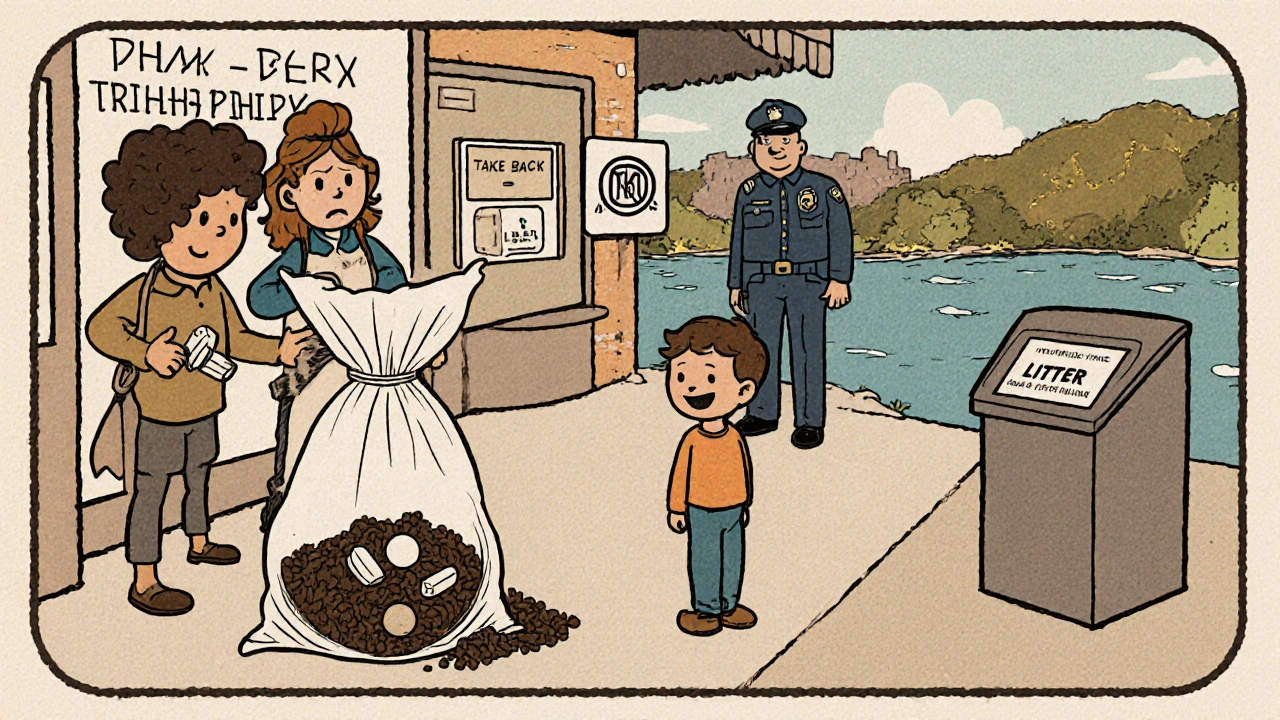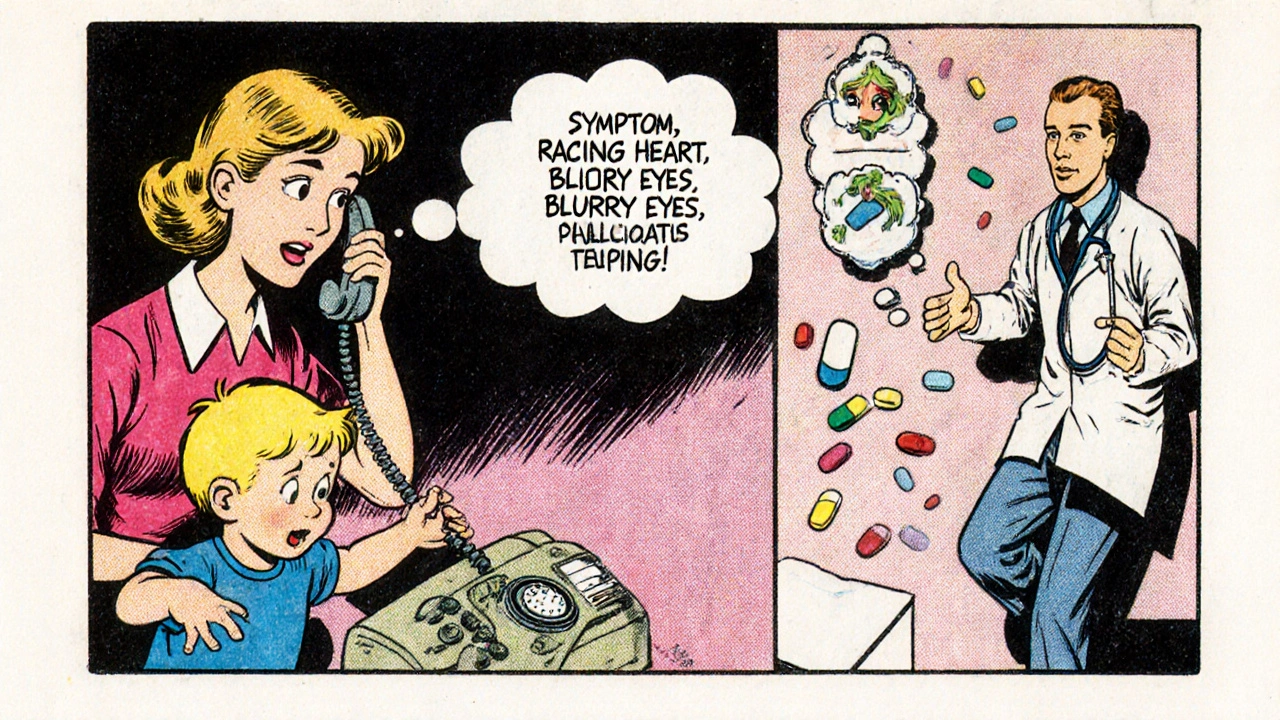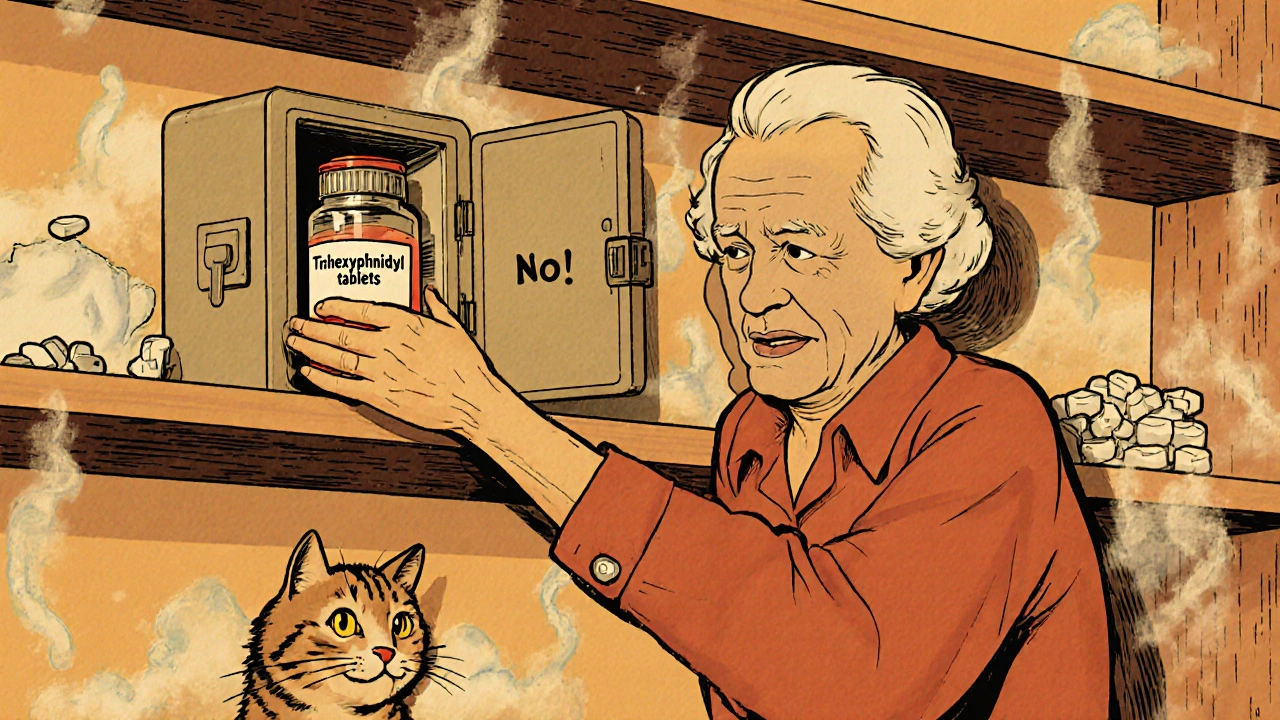Trihexyphenidyl is a prescription medicine used mainly to treat symptoms of Parkinson’s disease and drug-induced movement disorders. It helps reduce tremors, stiffness, and muscle spasms. But like all medications, how you store and dispose of it matters-not just for effectiveness, but for safety. Improper storage can make it less effective. Improper disposal can put kids, pets, or the environment at risk. This isn’t just about following rules. It’s about preventing accidents.
How to Store Trihexyphenidyl Correctly
Trihexyphenidyl comes in tablet form, usually packaged in blister packs or plastic bottles. The key to keeping it safe and working right is controlling temperature, moisture, and access.
- Keep it at room temperature-between 68°F and 77°F (20°C to 25°C). Avoid places like the bathroom cabinet, where steam and humidity can break down the tablets.
- Store it in a dry place. Moisture causes pills to crumble or lose potency. A bedroom drawer or kitchen cabinet away from the sink is better than the bathroom.
- Always keep it in its original container. The label has the name, dosage, and expiration date. If you transfer it to a pill organizer, keep the original bottle nearby as a backup.
- Lock it up if children, teens, or pets are in the house. Trihexyphenidyl can cause serious side effects if taken accidentally-rapid heartbeat, confusion, hallucinations, or even seizures. A locked medicine box or high cabinet out of reach is not optional.
- Check the expiration date. Expired trihexyphenidyl may not work as intended. Don’t use it past that date, even if it looks fine.
Some people keep their meds in the fridge. That’s not necessary for trihexyphenidyl. Cold temperatures can actually damage the tablet coating. Stick to room temperature unless your pharmacist says otherwise.
Why Safe Disposal Matters
Every year, millions of unused pills end up flushed down the toilet, tossed in the trash, or left in medicine cabinets. This isn’t harmless. Medications in water supplies have been detected in rivers and drinking water. Children and pets find pills in trash cans. People misuse leftover drugs-especially those that affect the nervous system like trihexyphenidyl.
Trihexyphenidyl is a controlled substance in some states because it can be misused. Even if you’re not at risk of abuse, others might be. Proper disposal removes that danger.
How to Dispose of Trihexyphenidyl Safely
The safest way to get rid of unused or expired trihexyphenidyl is through a drug take-back program. These are run by pharmacies, hospitals, or local law enforcement agencies.
- Check if your local pharmacy offers a take-back bin. Many chain pharmacies like CVS, Walgreens, and Rite Aid have them in-store.
- Look up the DEA’s National Prescription Drug Take Back Day. It happens twice a year-usually in April and October. Drop-off locations are listed on deas.gov/takebackday.
- If you live near a police station or hospital, ask if they accept unused medications. Many do, even outside of Take Back Day.
If no take-back option is available, here’s what to do:
- Take the tablets out of the original bottle. Mix them with something unappealing-used coffee grounds, kitty litter, or dirt. This makes them less attractive to kids or pets, and harder to misuse.
- Put the mixture in a sealed plastic bag or container. Don’t use a clear bag.
- Throw the sealed container in your household trash.
- Scratch out or cover your name and prescription details on the empty bottle before recycling it. This protects your privacy.
Never flush trihexyphenidyl unless the label or FDA’s flush list specifically says to. Trihexyphenidyl is not on that list. Flushing it adds unnecessary chemicals to water systems.

What Not to Do
Here are common mistakes people make-and why they’re dangerous:
- Don’t share your pills. Trihexyphenidyl is prescribed for your specific condition and weight. Someone else might have a bad reaction.
- Don’t leave it on the counter. Even for a few minutes, it’s a risk. A curious toddler or a visiting teen could grab it.
- Don’t pour it down the drain. It doesn’t break down easily and can harm aquatic life.
- Don’t keep old pills "just in case." If you’re not taking it anymore, the risk of accidental use or misuse outweighs any perceived benefit.
Special Cases: What If You’re Traveling?
If you’re on a trip and need to carry trihexyphenidyl, keep it in your carry-on bag-not checked luggage. Airlines and security won’t question prescription meds in their original bottles.
Use a small pill case if needed, but always bring the original bottle with the prescription label. If you’re crossing state lines, know that some states have stricter rules on controlled substances. Trihexyphenidyl isn’t federally scheduled, but some states treat it as such. Having the label protects you.
What to Do If Someone Accidentally Takes It
If a child, pet, or adult accidentally swallows trihexyphenidyl, act fast.
- Call Poison Control at 1-800-222-1222 immediately. They’re available 24/7 and give free, expert advice.
- If the person is unconscious, having trouble breathing, or having seizures, call 911.
- Don’t wait for symptoms to appear. Side effects can start within 30 minutes.
- Have the pill bottle ready when you call. The dosage and time of ingestion matter.
Common signs of overdose include dry mouth, blurred vision, fast heartbeat, confusion, hallucinations, and difficulty urinating. In rare cases, it can lead to coma or death.

How Long Does Trihexyphenidyl Last?
Trihexyphenidyl stays in your system for about 24 to 48 hours. But the tablets themselves don’t expire quickly-usually 2 to 3 years from manufacture. Still, don’t rely on old pills. Your condition might have changed, or the drug might have degraded. Always check with your pharmacist before using any medication past its expiration date.
Questions You Might Have
Can I recycle the trihexyphenidyl bottle?
Yes, but only after removing the label or scratching out personal information. Most plastic prescription bottles are recyclable (usually #5 plastic). Check your local recycling rules-some programs require the cap to be removed. Never recycle pills or pill residue.
Is it safe to mix trihexyphenidyl with other medications before disposal?
No. Mixing different drugs can create dangerous chemical reactions or make the mixture harder to handle safely. Always dispose of each medication separately. Mix each one with an unappealing substance like coffee grounds or kitty litter, then seal each in its own bag.
What if I can’t find a drug take-back program near me?
If no take-back location is available, use the FDA’s at-home disposal method: mix the tablets with an unappealing substance like used coffee grounds or dirt, seal them in a plastic bag, and throw them in the trash. Always remove personal info from the bottle first. This is the safest fallback when professional disposal isn’t an option.
Can I flush trihexyphenidyl if I don’t have time to dispose of it properly?
No. Trihexyphenidyl is not on the FDA’s flush list. Flushing it adds harmful chemicals to water systems and can harm wildlife. Even if you’re in a hurry, take the extra five minutes to mix it with coffee grounds and toss it in the trash. It’s the responsible choice.
How often should I check my medicine cabinet for expired drugs?
Every six months is a good rule. Spring and fall are easy times to remember-when you change your clocks or clean out your closet. Look for pills that are discolored, crumbly, or smell odd. Even if they look fine, if they’re past the expiration date, dispose of them safely.
Final Thoughts
Storing and disposing of trihexyphenidyl isn’t just about following instructions-it’s about protecting your family, your community, and the environment. A single pill left in an unlocked cabinet can lead to an emergency room visit. A bottle flushed down the toilet can pollute a river. Taking a few minutes to lock it up and drop it off at a take-back site prevents real harm.
If you’re unsure about what to do, call your pharmacist. They’re trained to help with this exact question. Don’t guess. Don’t delay. Safe handling starts with you.


Robert Andersen
Man, I never thought about how meds like this can just sit in a drawer and become a hazard. I used to keep all my pills in the bathroom cabinet because it was convenient. Now I know that’s basically a humidity-powered pill destructor. Learned something today.
Also, the part about not flushing it? That’s huge. I always figured if it’s gone, it’s gone. But now I get it-water systems aren’t magic trash disposals. We’re all just dumping chemicals into the same water we drink. Wild.
Eli Grinvald
Thank you for this. 🙏 I’ve been holding onto old meds for years because I didn’t know what to do. Now I’m going to clean out my cabinet this weekend. Also, coffee grounds? Genius. My cat would’ve eaten them otherwise. 😅
Caden Little
Big shoutout to whoever wrote this-this is exactly the kind of info people need but never get. Most of us just toss meds in the trash like it’s no big deal. But seriously, mixing with kitty litter or coffee grounds? That’s low-effort, high-impact safety.
And locking it up? If you’ve got kids, teens, or even curious pets? Non-negotiable. I had a cousin’s kid swallow half a bottle of something similar once. ER visit. ICU. All because it was on a nightstand. Don’t be that person. Lock it up.
Also, take-back programs exist for a reason. Use them. Your local pharmacy probably has a bin right by the register. No excuse.
Alexander Ståhlberg
Let me just say-this post is the reason society is collapsing. You’re telling people to lock up their medicine like it’s contraband? Like we’re living in a dystopian police state where your own pills are a threat? Who decided this was a problem? The pharmaceutical industry? The FDA? The same people who made you pay $200 for a 30-day supply of a drug that’s been around since the 1950s?
And now you want me to drive 20 miles to a pharmacy that might not even have a drop box? Or wait for a government-sponsored ‘Take Back Day’ that happens twice a year? That’s not safety-that’s bureaucratic theater. Meanwhile, real addicts are still getting their hands on pills from the same damn cabinet you’re trying to turn into Fort Knox.
And don’t get me started on the coffee grounds. You really think a toddler’s gonna look at a pile of bitter grounds and go, ‘Nah, I’ll pass’? They’ll eat the whole damn bag. And you’re worried about the environment? Newsflash: the real poison is the corporate greed that made this drug a necessity in the first place. Fix that. Not the disposal method.
Angie Creed
Interesting how we’ve turned pharmaceutical stewardship into a moral crusade, while ignoring the systemic failures that make these drugs necessary in the first place. We’re scolding individuals for not properly disposing of trihexyphenidyl-when the real crime is the medical-industrial complex that overprescribes it, then abandons patients when side effects emerge.
And yet, here we are: policing pill bottles like they’re nuclear waste, while ignoring the fact that most people who misuse these drugs got them from friends, family, or unregulated online pharmacies.
Locking it up? Sure. But don’t pretend this is about safety. It’s about control. And control is the last refuge of the anxious middle class.
Josh Arce
yo so trihexyphenidyl is like a benzo but not really? it’s an anticholinergic right? so it blocks acetylcholine? that’s why it causes dry mouth and blurry vision and all that? so if you flush it, the anticholinergic compounds don’t break down in water? they bioaccumulate? like in fish brains? that’s wild. i didn’t know meds could do that. so mixing with coffee grounds is just to make it unappetizing? not to neutralize it? because it’s still toxic in the landfill? so we’re just delaying the problem?
also why is this not federally scheduled? it’s got hallucinogenic potential. that’s a class 4 narcotic in some countries. why is the usa so chill about it?
brajagopal debbarma
So you’re telling me I have to go to a pharmacy to throw away a pill? In India we just flush it or give it to the beggar outside the hospital. He’s probably more grateful than your local pharmacist. At least he doesn’t charge you $5 for a drop-off bin.
Also, locked cabinet? My cousin’s kid stole my dad’s blood pressure pills last year. He threw them in the river. No one died. The river survived. Maybe we should just let nature handle it.
Carly Smith
Why are we even talking about this like it’s a big deal? I’ve had this drug for years. I’ve left it on my nightstand. My dog licked the bottle once. He was fine. I’ve flushed it before. No one died. The environment’s fine. You people act like a single pill is going to poison the entire watershed. It’s not even a controlled substance in most places. Chill out.
Also why is everyone so obsessed with locking things up? Are we raising children in bunkers now? Just teach them not to eat random pills. Simple. Done. No drama.
Alexis Hernandez
I love how this post breaks it down like a friendly neighbor who actually cares. No jargon, no fear-mongering, just clear steps. I used to think ‘take-back programs’ were just a myth until I found one at my local CVS last month. Walked in, handed them my old meds, got a free coffee coupon. That’s the kind of system we need more of.
And the coffee grounds tip? I’m stealing that. My dog’s a pill ninja. He once ate my sister’s thyroid med. She cried. I don’t want that again. So now everything goes in a sealed bag with used grounds. It’s weird, but it works.
Also-check your cabinet every six months? Yes. I did it last spring. Found three expired things I’d totally forgotten about. One was from 2018. I felt like a hoarder. But now I feel lighter. Like I cleared out emotional clutter too.
Sebastian Brice
Man, I used to think I was being responsible by keeping my meds in the original bottle. Turns out I was just being lazy. I never scratched out my info. I just tossed the bottle in the recycling. Like, duh. Now I’m gonna use a Sharpie on every label. And I’m gonna start keeping a small box in the closet labeled ‘Medication Graveyard.’
Also-this whole thing about not sharing? I’ve seen people do it. ‘Oh, I’ve got extra, take one.’ Like it’s Advil. But this stuff? It’s not. It’s like handing someone a loaded gun and saying ‘You look stressed.’
Jim Aondongu
Why are you so worried about the environment when your own country is dumping plastic into oceans? You care about one pill but not about the 500 plastic bottles you throw away every month? This is performative safety. You want to feel good about yourself so you lock your pills. Meanwhile, your carbon footprint is bigger than a small country. Just stop pretending this matters.
Jackie R
Stop. Just stop. This is why America is broken. You treat medicine like it’s radioactive. It’s a pill. It’s not a bomb. Locking it up? Flushing it? Coffee grounds? This is overreach. People used to live without this much paranoia. We had medicine cabinets. We had kids. We had pets. We survived. Now we’re all terrified of a single tablet. Pathetic.
Kurt Stallings
Disposal protocols are a bourgeois distraction. The real issue is pharmaceutical capitalism. The state manufactures dependency then criminalizes the symptoms. You lock your pills? Good. You feel virtuous. Meanwhile, the system that made you need this drug in the first place keeps running. Your compliance is the opiate.